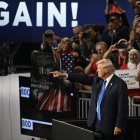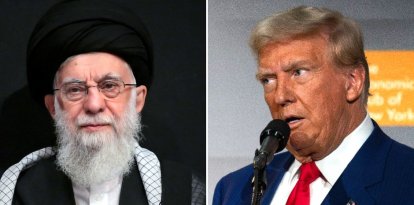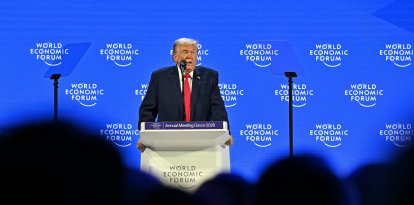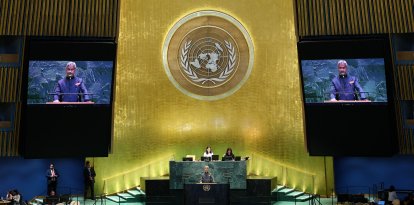Understanding the importance of J.D. Vance
Jews have been taught to fear populist movements. But the rise of populist conservatives is a threat to the political establishment, not the Jewish people.

Donald Trump and JD Vance at 2024 RNC
If there’s one political story that never gets as much attention as it deserves, it’s the choice of a vice-presidential nominee. And it could turn out that former President Donald Trump’s decision to pick Sen. J.D. Vance (R-Ohio) as his running mate may have an impact on American politics and policies for many years to come.
This is why the loud and angry debate about Vance, his background, political philosophy, foreign-policy views and journey from "Never Trump" critic to ardent supporter of the 45th president goes far beyond the usual analysis of such a nomination.
It’s true that very few people vote based on who is on the bottom of the ticket. The vice presidency is also a position without formal power, even if it is only a heartbeat from the presidency. But eight out of America’s last 22 presidents were vice presidents first.

Politics
JD Vance appeals to his roots in an emotional speech at the Republican National Convention
Joaquín Núñez
Four of them rose to the role as a result of the death of the president (Theodore Roosevelt, Calvin Coolidge, Harry Truman and Lyndon Johnson); one due to the resignation of the president (Gerald Ford); and three won on their own after serving time as the second banana (Richard Nixon, George H.W. Bush and Joe Biden).
Such a promotion is by no means guaranteed for Vance. If Biden mounts a miraculous comeback in November and the Republicans lose, he may only become someone who is the answer to a trivia question, along with Tim Kaine, Paul Ryan, Sarah Palin, John Edwards and Joe Lieberman, rather than a future president.
A consequential choice
But more than is typical of those who are tapped as running mates, Vance is set up for bigger things.
Most vice presidents—including those, like the elder George Bush and Biden, who eventually won the presidency—were picked because they were thought to give the ticket some marginal political advantage or represented a compromise between the nominee and factions of his party that hadn’t supported him.
Vance was not chosen because he "balances" the ticket in any way. He shares Trump’s views on major issues and is considered among the most articulate advocates for those views. That makes him a credible successor to Trump as leader of a Republican Party that has undergone a remarkable transformation in the last eight years.
Just as important, he could be in a stronger position to succeed to the presidency than most veep nominees simply because Trump is limited to a single term. Which means that, assuming Trump wins, and perhaps even if he doesn’t, Vance will, at the very least, enter the 2028 presidential race as one of the frontrunners.
This is precisely why the arguments about him matter.
"The 'MAGA' movement is a conscious attempt to change the orientation of Republican politics from a concern about what’s good for Wall Street to one that takes into account the needs of the working class."
At its heart, the debate about Vance concerns a political philosophy that has come to be known as national conservatism. The core of the polemic is a willingness to rethink what it means to be both a conservative and a political leader in the 21st century.
It rejects a lot of conventional wisdom about economics and foreign policy that was largely accepted by most Republicans two decades ago when George W. Bush was president. And that means it is rooted in pushback against the political establishment and the credentialed elites who have largely controlled not only the party and the government, but big business and mainstream culture, as well.
It may be ironic that this sea change in conservative thinking is led by a man like Trump who was born into wealth and whose lifestyle and behavior largely epitomize what it means to be rich, influential and have an outsized footprint in pop culture. Nevertheless, the so-called MAGA (from the Trump slogan "Make America Great Again") movement, is a conscious attempt to change the orientation of Republican politics from a concern about what’s good for Wall Street to one that takes into account the needs of the working class.
The ‘deplorables’ take over
That’s shocking for those who led the GOP only a few years ago. Though they welcomed the votes of Americans from lower economic strata, they had little direct interest in their welfare or what mattered to them. And, though they were reluctant to admit it publicly, they shared the sneering contempt for the working class that was expressed by Democrats like President Barack Obama, when he disparaged those who "clung to guns or religion," or were, as Hillary Clinton memorably put it, "deplorables."
Establishment GOP leaders and pundits supported economic policies and international trade agreements that essentially impoverished many Americans by hollowing out the country’s manufacturing base and outsourcing jobs abroad. They also ardently opposed worker-friendly policies that might soften the blow.
In addition, they also dismissed the impact of illegal immigration on the working class, something that was very much in sync with the desires of big business, which welcomed the influx of people who would depress wages for workers.
They did so in the name of the free market and the sort of doctrinaire economic liberalism that was very much at the center of the conservative agenda of iconic figures like President Ronald Reagan and British Prime Minister Margaret Thatcher.

Economy
Trump details in depth his economic policy: Promises more tariffs and to lower the corporate tax to 15%
Emmanuel Alejandro Rondón
The above was, in essence, the definition of conservatism that ruled the GOP until the advent of Trump. And it was popular not just with Wall Street, but also with college-educated voters, a demographic slice of the electorate that was reliably Republican. Liberal economics and global trade made a lot of Americans wealthier and reduced the costs of many consumer items.
But it also left many Americans behind, destroyed communities and robbed the United States of the manufacturing capacity to produce the arms that traditional conservative foreign-policy hawks required to fund both American wars and new causes like Ukraine’s fight against Russia.
Trump was no ideologue. But his instincts were populist and among the issues on which he had really strong beliefs when he entered politics in 2015 were trade and illegal immigration. Speaking to those issues resonated with lower-income voters whom Republicans had failed to win over in the past and who were more likely to vote for the Democrats.
"Positions that were seen as heresy to conservatives are now applause lines at Republican conventions."
On foreign policy, Trump also was a critic of the post 9/11 wars in Afghanistan and Iraq that began during the presidency of George W. Bush. But Trump was willing to start discussing the NATO alliance in the same way he talked about trade agreements like NAFTA, by questioning whether it was outdated or if it was fair to ask American taxpayers to pay for the defense of wealthy European countries that were spending very little on their own militaries.
All that was anathema to the Republicans who dominated their party under Reagan and the Bushes, and then nominated John McCain and Mitt Romney in failed bids to defeat Obama. They viewed the sort of populist common-good conservatism that was oriented more to working class concerns and needs as "socialism."
And since most of them were guided by the anti-Communist assumptions about the world that were embraced by conservatives during the Cold War, they viewed any reluctance to exercise American power abroad as akin to the way Democrats had often sought to appease the Soviet Union or as a betrayal of the obligation to fight Islamist terror after 9/11. In this way, they came to label any second thoughts about disasters like the wars in Iraq and Afghanistan, let alone a sacred cow like NATO, as “isolationism” and a betrayal of the legacy of Reagan.
But now positions that were seen as heresy to conservatives are applause lines at Republican conventions. To liberals and conservatives who oppose this shift, this is evidence that the GOP has simply surrendered to the Trump populist cult.
But while the devotion to Trump—reinforced by the attempt to assassinate him and his pose of defiance after being wounded—goes far beyond the good feelings evoked by most politicians among their supporters, there’s more to it than that. Trump’s success lies in his ability to tap into the resentments of working-class voters and simultaneously to a desire to create a political movement that embodies traditional conservative values of liberty and patriotism. But the "populist" aspect of this shift scares some people.
Populism and antisemitism
The word "populist" has always scared Jews. The populist movement in the United States in the late 19th and early 20th centuries began as an agrarian splinter party and then, to a large extent, took over the Democratic Party in the 1890s under the banner of three-time loser William Jennings Bryan.
That form of populism embraced some nonsensical economic theories like "bimetallism" and the desire of poor farmers to have their debts canceled. But because it looked to bankers and capitalists as the root of all evil, it was also connected to antisemitism, a sentiment that some populist leaders like Georgia’s Tom Watson—who helped whip up the hatred behind the infamous lynching of Leo Frank, an Atlanta Jew who was falsely accused of murder—exploited.
That same fear of populist sentiment was never far below the surface throughout the 20th century, with demagogic radio preachers like Father Coughlin, who mixed in antisemitism and pseudo-fascism with his advocacy for workers’ rights. The appeal of such figures and their ability to foment hate reinforced the notion that uneducated people who have been displaced by modern economic developments are not so much to be helped by society as feared.
"Vance was a strong critic of Trump but, like a lot of other conservatives, he changed his mind about him."
But the antisemitism that was so much a part of American populism in the past is noticeably absent in a MAGA world that is, with only a few exceptions, reflexively pro-Israel and philosemitic. While Jews are disproportionately members of the credentialed elites who benefited from the current system, neither the rhetoric nor the substance of this critique of the old GOP establishment is linked to attacks on Israel as is now common on the left.
To speak now of the problems engendered by the globalist policies championed by the elites who flock to Davos, Switzerland for the World Economic Forum, is not a dog whistle to extremists. It is a rallying cry to resist corrupt forces that are genuinely harming Americans and empowering antisemites.
Conversion to Trumpism
Vance’s rise is based on his ability to explain the complaints of Americans who were left behind by decisions made by both Republican and Democratic presidents. He first became known because of his bestselling memoir Hillbilly Elegy, which placed his own experiences in the context of the socioeconomic challenges faced by poor whites living in Appalachia and the rust belt.
The enthusiastic reception it received from the chattering classes was rooted in their eagerness for an explanation for why this demographic group was open to voting for Trump, though he wasn’t mentioned in the book. But some on the left hated it, because it correctly sought to shift the focus from the alleged racism of poor whites to the struggles of the working class, regardless of their color or ethnicity.
Vance’s own life story was an inspiring rags-to-riches tale. He survived a difficult childhood with a mother who was an addict, to go on to service in the Marines, then college and Yale Law School, and a successful career as a venture capitalist before winning an Ohio Senate seat in 2022.
In 2016, Vance was a strong critic of Trump but, like a lot of other conservatives, he changed his mind about him. That was due to his performance as president and he way the left and the D.C. establishment demonstrated that they would do virtually anything to destroy someone who was neither part of their elite clique nor one of the "experts" in the governing class.
This is now put forward by his critics as a sign of his insincerity and ruthless ambition. Though, as is true for anyone in politics, ambition may have played some role in his conversion (interestingly, he underwent a religious conversion during this same period, becoming a Catholic in 2017), it seems primarily rooted in a recognition that the policies of those who purported to lead the conservative movement were not actually conservative. If they were, they wouldn’t be indifferent to the way global economics and illegal immigration destroys lives and communities and undermines traditional American values.
Nor would he, as the Bush-era Republicans did, stand by and allow the collapse of the manufacturing sector and the enrichment of China that undermined America’s national security.
More to the point, and unlike other leading politicians, Trump seemed to get it. Imperfect and inconsistent though he may be, he cared about those who were hurt by globalist policies and his economic, trade and foreign-policy positions were essentially sensible. And he was opposed to the woke ideological policies that sought to divert Americans from the real economic problems faced by working people to divisive fake concerns about racism.
At 39 (he turns 40 on Aug. 2) and with less than 2 years’ service in the Senate, Vance has yet to be tested on the national stage. But he is an articulate spokesman for a movement that is putting forth a version of conservatism that is more in tune with the needs of ordinary voters.
It is also in stark opposition to the leftist ideology and its woke catechism of diversity, equity and inclusion (DEI) that has taken over our education system, culture, the media and, thanks to Biden, the federal bureaucracy, which is in desperate need of reform. This leftist orthodoxy is the animating force behind the current surge in antisemitism. And far from abetting Jew hatred, the new conservative populism is the only force that stands a chance of resisting and rolling it back.
Vance’s opposition to continuing the funding of an endless war in Ukraine which is eating up resources that might better be spent on aiding Israel, stopping Iran and deterring China is disqualifying for some on the right who are still obsessed with Russia. They wrongly believe that putting so much of our resources into Ukraine will magically strengthen Israel and Taiwan. But his critics have no answer to his arguments about the need for America to pick and choose its fights carefully in an era when its capacity to produce arms is no longer unlimited.
"With his nomination, Vance is now poised to ensure that this turn toward national conservatism is no passing phase."
Assuming Trump wins in November, we don’t know how Vance will fare in the second slot, as there will be plenty of opportunities for him to stumble or to displease the president. But what makes him both interesting and dangerous to the D.C. establishment is that he provides the intellectual muscle for a new conservative vision for the country.
It isn’t the same conservatism of Reagan and Thatcher, and that’s hard for an older generation of Republicans to absorb. But the challenges America, Israel and the world must now deal with are not the same as those that faced the West in the 1980s, when the "evil empire" in Moscow still threatened the world with Communism.
Yet with his nomination, Vance is now poised to ensure that this turn toward national conservatism is no passing phase that will be erased by a comeback of Never-Trump Bush-era Republicans who still dream of taking the GOP back from the "deplorables." If he succeeds, the decision to tap him for the vice presidency may turn out to be among the most consequential of Trump’s decisions.
© JNS




























